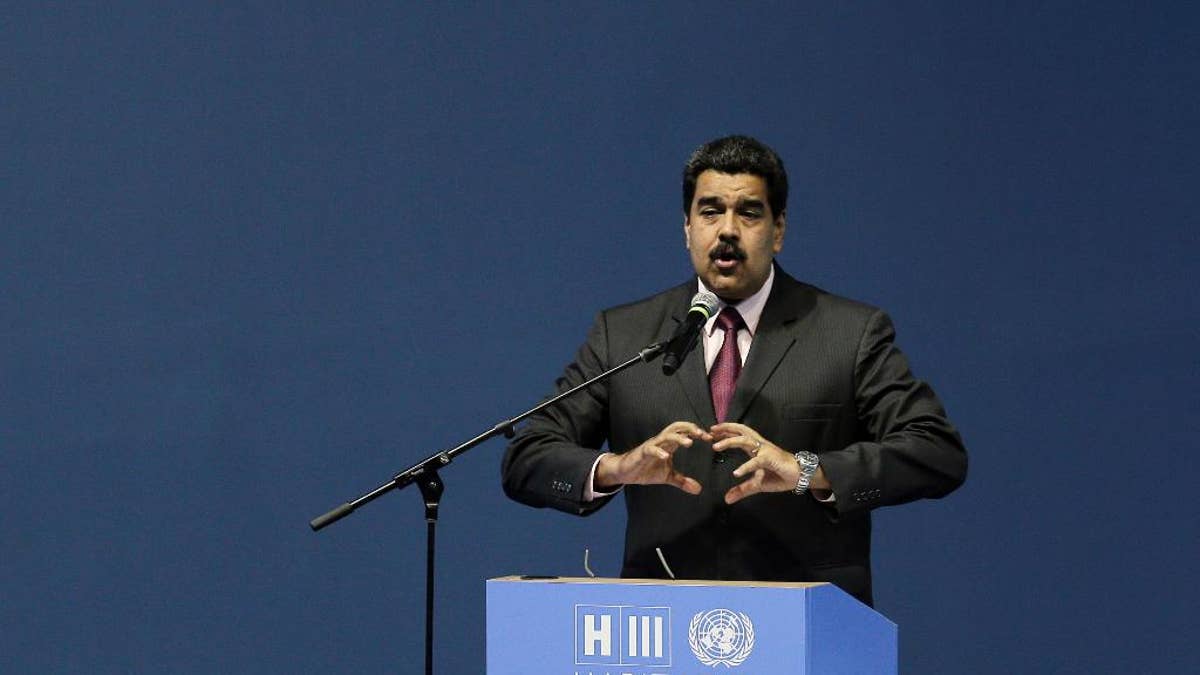
Venezuela's President Nicolas Maduro speaks during the opening of the third United Nations Habitat Conference, in Quito, Ecuador, Monday, Oct. 17, 2016. The meeting kicked off in Quito on Monday with the goal of tackling haphazard growth and fostering livable, self-sustaining cities amid a boom in the global urban population. (AP Photo/Dolores Ochoa) (The Associated Press)
CARACAS, Venezuela – Venezuela's electoral authority suspended a recall drive against President Nicolas Maduro on Thursday less than a week before it was set to start, throwing the opposition's key campaign to oust the socialist leader into disarray.
Officials cited alleged fraud in a preliminary signature-gathering effort as justification for blocking the opposition from proceeding to the next stage of its push to hold a referendum on Maduro's removal. His critics blame the late President Hugo Chavez's heir for Venezuela's economic collapse, bare store shelves and the jailing of opposition leaders.
The opposition immediately blasted the decision as unconstitutional.
"We alert the diplomatic corps in our country that the government today is pushing toward a very dangerous scenario," former presidential candidate Henrique Capriles said on Twitter.
The official announcement came as a shock to many Venezuelans, who were gearing up for the chance to sign petitions next week seeking the embattled leader's removal. To trigger a stay-or-go referendum, the opposition needed to collect and validate some 4 million signatures from 20 percent of the electorate in 24 states over three days next week.
Critics of Venezuela's 17-year left-wing administration have made the recall their central political issue after being sidelined in Congress and in virtually all other public institutions. But the campaign had already become mostly symbolic after elections officials in September said no vote would take place this year.
That timing is crucial. A successful vote to oust Maduro this year would have triggered a presidential election and given the opposition a good shot at winning power. If Maduro is voted out in 2017, though, his vice president will finish the presidential term, leaving the socialists in charge.
The electoral council's decision Thursday was in response to rulings earlier in the day by courts in four Venezuelan states that found there was fraud in the initial stage of the petition drive. During that stage the opposition had collected signatures from 1 percent of electorate.
But in standing by those low-court rulings it appeared to be ignoring its own decision in August validating the signatures and allowing the process to move forward. It gave no indication if and when the process would be resumed.
"In adherence with the constitution, the National Electoral Council abides by the decisions ordered by the tribunals and has sent instructions to postpone the process of signature gathering until new judicial instructions are known," it said in a statement.
Although the government-stacked electoral board had already thrown a number of obstacles in the way of Maduro's opponents, many had hoped that the next stage of the complex process would have drawn onto the streets millions of Venezuelans who polls show overwhelmingly favor firing Maduro, who they blame for triple-digit inflation and long food lines.
The ruling comes on the heels of another decision by the electoral council this week to suspend by about six months gubernatorial elections that were slated for year-end which the opposition was heavily favored to win.
Polls say a majority of Venezuelans want Maduro gone. The opposition charges that in the face of overwhelming voter discontent, the socialist party has simply decided to put off elections indefinitely.
The opposition staged its largest street demonstration in years on Sept. 1, with a rally in Caracas demanding a referendum against Maduro be held in 2016. But apart from that protest, most anti-government rallies this year have been relatively small and quick to disperse.
On Thursday night, hard line leaders started calling for more massive street protests in the face of election authority's ruling.
"This is the time for national unity," wrote former presidential candidate Maria Corina Machado on her Twitter account. "Every single person must take to the streets, with strength and without fear, to make the transition a reality."




















